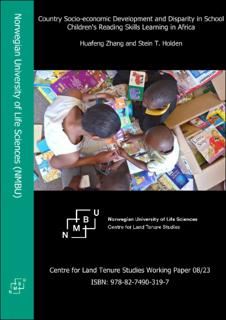| dc.description.abstract | To achieve the overarching goal of "education for all," there is a growing interest in understanding school learning outcomes and disparities among school children from disadvantaged backgrounds in Africa. This study employs data from standardized reading skill tests conducted in 11 low-income and lower-middle-income African countries through the Multiple Indicator Cluster Surveys (MICS) to evaluate children's learning outcomes. Drawing from recent nationally representative data, this multi-country study investigates the impact of various factors, including a country's socio-economic development, rural-urban disparities, family background, and disability status, on children's reading skills acquisition.
Our study reveals that reading proficiency among children is generally low and exhibits significant variation across the 11 African countries under examination. Notably, reading skills proficiency rates are lower in countries with lower GDP per capita, smaller government education expenditure relative to GDP per capita, lower school enrolment, and higher pupil-teacher ratios. The study identifies notable learning gaps among children from disadvantaged backgrounds, including disabled children, those residing in rural areas, and those from poorer and less educated families.
We specifically investigate the reading skills disparities between disabled and non-disabled children across various social categories and countries. These reading skills disparities remain fairly constant across the different social backgrounds, indicating that disabled children benefit equally from improved conditions as other children do. These results underscore the critical role of macroeconomic development and social equity in enhancing reading skills for all. To effectively reduce this gap, further targeted research is essential to understand the dynamics and identify tailored interventions. | en_US |

